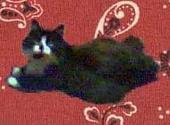The tao of tzu-jan and libertarianism
 BK Marcus has provided an interesting blog post about Taoism and libertarian thought called "ancient Chinese secret". The secret is that certain libertarian ideals, such as the free market, have roots in ancient Chinese thought, most notably within the Taoist tradition. As with BK, I previously knew of people like Lao Tzu as being libertarian in their thinking, but his post reveals information sent to him via e-mail that shows an actual historical link between Taoist thought and the Western birth of classical liberalism many moons later.
BK Marcus has provided an interesting blog post about Taoism and libertarian thought called "ancient Chinese secret". The secret is that certain libertarian ideals, such as the free market, have roots in ancient Chinese thought, most notably within the Taoist tradition. As with BK, I previously knew of people like Lao Tzu as being libertarian in their thinking, but his post reveals information sent to him via e-mail that shows an actual historical link between Taoist thought and the Western birth of classical liberalism many moons later.Since first encountering them, I've been quite fond of some of the Lao Tzu quotes that succinctly express his libertarian views. The quotes provided by BK include:
Why are people starving?
Because the rulers eat up the money in taxes.
Therefore the people are starving.
Why are the people rebellious?
Because the rulers interfere too much.
Therefore they are rebellious.
The more prohibitions there are, the poorer the people will be.
The more rules and regulations, The more thieves and robbers.
In addition to those, here are a few more that show the Taoist preference for nature (or tzu-jan) to take it's course as opposed to using coercive intervention to govern individuals:
"When government is too intrusive, people lose their spirit."
"Without law or compulsion, men would dwell in harmony"
"Therefore,
The sage does nothing and people govern themselves,
Provokes no one and people are peaceful,
Does not interfere and people prosper,
Is without desire and people fulfill themselves.
The more people are controlled, the less contented they become.
But when will leaders understand the significance of this?"
"The world is ruled by letting things take their course. It cannot be ruled by interfering."
"I let go of all desire for the common good, and the good becomes as common as the grass."
Before deciding to write this post, I made a brief trip to Google to see if I could find anything else of interest to add to this post. I actually came across an article by Travis Stansel titled "Why I'm Not A Libertarian" that refers to Lao Tzu. The article is, unfortunately, largely another example of someone who mistakenly views all libertarians as a bunch of pot-smoking corporate apologists and the free market as a big business utopia. That is, of course, absolute hogwash. Stansel is correct in noting that all forms of power pose a threat to human liberty, but that is something that real libertarians acknowledge.
Although he refers to Lao Tzu earlier in the article, it is at the end where he claims to use the wisdom of Lao Tzu to discredit libertarianism. He writes:
Lao-Tzu answers the Libertarian privatization dogma with this: "Own no interest, and the people cooperate with each other."I must say that the quote he refers to is an interesting one, and one that I don't quite understand. What I'm unsure of is what Lao Tzu means by "interest". I assume that Stansel uses that quote to refer to resources being owned by private (i.e. corporate) power - the type of power that he thinks that libertarians excuse. He's also likely referring to the various examples of faux privatization that conservatives and the vulgarites talk highly of. But how does a statist regulatory system represent any sort of salvation? It doesn't, and Stansel conveniently ignores Lao Tzu's dismissal of such a route. Then there's the alternative of government ownership, which Lao Tzu would certainly rule out as well. It may have been a cute ending to his piece, but I think that Stansel is out of his element here.
Anyone out there wish to comment on that particular Lao Tzu quote and what they think it suggests?





















2 Comments:
"Own no interest in other people's property nor their possessions, and the people cooperate with each other.
Thanks, Iceberg!
That quote would certainly apply to the government as well in terms of both regulation and ownership.
Post a Comment
<< Home